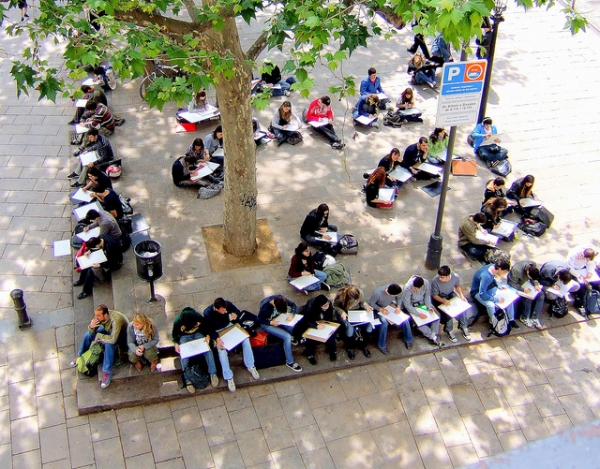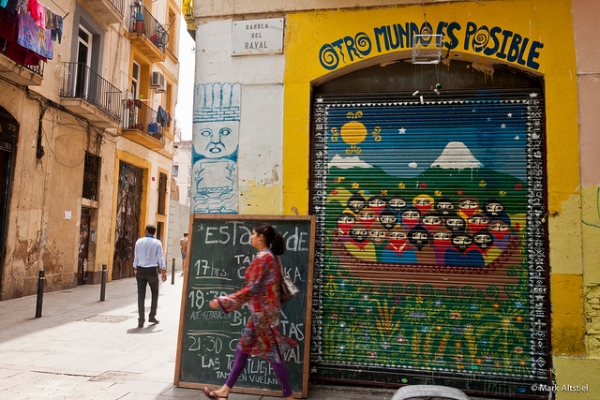Nu pierdeți cele mai bune locuri de muncă!
Abonează-te și săptămânal iți vom trimite un email cu ultimele locuri de muncă disponibile. Introdu adresa ta de email mai jos
If you picture your time studying abroad immersed in European styling, amongst grand, artistic architecture in a cosmopolitan setting, and situated by the azure waters of the Mediterranean, then Barcelona is the city for you.
Barcelona is both diverse in ethnicity and rich in culture. To study in this city is to not only being based in the capital of the autonomous community of Catalonia, but it’s also Spain’s second largest city.
A dual linguistic city, speaking both Castilian Spanish and Catalan, Barcelona is an enriching community to live and study abroad in.
Some schools worth checking out
Barcelona has some of the best learning facilities in Spain. Whether you wish to add history, business, humanities or more, to compliment your language studies, completing or complimenting your studies in Barcelona is a truly life-changing experience.
The Universitat Autonoma de Barcelona (UAB) has been a well-respected education leader in Spain since 1968, rated second highest in the country, with some 43,000 students and 13 faculties. Known for its sense of community, given its purpose built centralized campus, which is located 20km from the center of the city. This is where quality education combines with Catalonian culture in a vibrant, though peaceful, study environment.
With a range of 75 undergraduate programs available, the Universitat de Barcelona (UB) is often the highest ranked university in Spain. Established in 1450, UB now has more than 90,600 students enrolled, within 18 faculties, placed in undergraduate and postgraduate courses. The university’s campuses are located in the inner city area, close to many student-housing options, and all that Barcelona has to offer.
THE places for student housing in Barcelona
The second most important decision you’ll need to make about studying in Barcelona is where will you live. Where is it that you can feel comfortable, safe and able to get to your campus without any stress?
There is no more a cosmopolitan neighborhood in Barcelona than Nou Barris. Filled with side streets and public squares amongst developed areas and others dated back to the 18th and 19th centuries. This budget-friendly district for students and locals alike is in the North of the city, with bus and metro links providing quick access to the city center.
If the city center is where you need to be, and your budget is more generous, then El Raval is an exuberant choice for students. You’ll be living amongst the city’s most popular sites, accessed through medieval alleyways and elaborate churches, as you go about your day-to-day student life here. This neighborhood does have a dark side, so do your homework before committing any funds.
Looking for European flare, cute cafes to sip espresso in while you catch up on your reading then do check out L’Eixample. This is the newer part of Barcelona, known for trendy shopping, and street grid system, L’Eixample is an effortless place to get established.
The cost of education in Barcelona
Barcelona is one of the more expensive cities in Spain to spend your euro, though quite reasonable compared to other European cities. Besides budgeting for your travel, visa and living costs, you will need to pay for your education costs. Depending where you chose to study, you’ll either be paying for an all-inclusive international study package, or be paying fees and tuition alone. Also if studying on a scholarship, it is worth checking whether this funding can go towards your expenses.
If considering the all-inclusive fully sponsored package, which may include housing and some meals, tuition, excursion and cultural activities and usually on-site student services, you could expect to pay in the vicinity of $12,000 USD per semester. Yes it’s costly, yet you are paying for the convenience of someone else taking the stress, and doing the footwork, of sourcing and negotiating on your behalf.
If coming from elsewhere in the EU, your course fees cost the same as what a Spanish student if charged. EU students can also apply for any of the scholarships or grants available to Spanish students. Tuition fees for EU students are approximately $1,200 USD per year at public universities, compared with $4,000 USD for non-EU students.
You’re here now, so what’s next?
By this stage you know where you’ll be studying, but you may have many loose ends still to tie up. First stop should be the Students Advisory Office (Centre d’Informacio i Assessorament per a Joves). This is a government run organization, so you’ll get factual, no-bias information here.
Secondly, track down your study facility’s Student Ambassadors, Program Coordinators and Student Support Services to get the specifics for your campus. Also introduce yourself to your fellow students and starting asking questions. You’ll benefit from their experiences, both good and bad.
Sign in to publish a comment



Be the first to comment on this post.